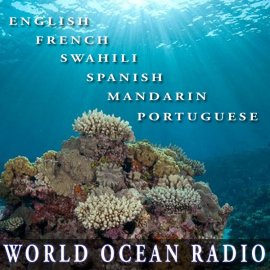350th Episode
-
English
-
ListenPause
I’m Peter Neill, Director of the World Ocean Observatory.
This broadcast is the 350th edition of World Ocean Radio, an audio feature developed in 2007 with the enthusiastic support of WERU Community Radio in Blue Hill, Maine, a mostly volunteer not-for-profit organization that provides a 24-hour stream of music of all genres and public affairs programming mostly locally-produced and unique to a coastal community far from the larger urban centers and the commercial radio spectrum. Our thanks to the WERU management and program committee, and all the supporters of the station for their immediate encouragement of a bright idea that one day just floated in with the tide.
The purpose of World Ocean Radio was to provide an inexpensive communications tool at no cost to “Citizens of the Ocean” in our neighborhood, the region, the United States, and around the world. We are now heard nationally and internationally through I-Tunes podcast, other stations in the US, through broadcast New Zealand, Australia, Hong Kong, and along both coasts of Africa through Internet stream. World Ocean Radio can also be heard through links to the Huffington Post and other partner organizations that post the link on their webpages as part of a public education agenda.
In 2014, we added another major dimension, by translating a selection of editions into French, Spanish, Portuguese, and Swahili. This year we will be adding Mandarin Chinese, thereby creating a resource that can be heard by a vast majority of listeners on earth. It is not possible for us to calculate the full dimension of our audience, other than to understand that the more successful we are, the more encompassing the extent of our information and educational service messaging worldwide.
The challenge of course is marketing, and we are extremely active in circulating the availability of weekly editions through all our social media connections. All programs are available to any user at no cost, thereby we have attempted to remove the conventional restrictions of money, advertising, distribution, and other factors that might limit our success.
But how to penetrate the Chinese market? How to be heard in the Portuguese and Spanish speaking countries of South America? How to expand into national networks in Europe? How to add Russian, German, Japanese, and other languages to realize a capacity through the universality of radio to reach every person on earth?
An absurd ambition, you might say. Well yes, but then the mission of the World Ocean Observatory is no less impractical, and yet we know that through the W2O website, audio, video aggregation, newsletter, e-magazine, partnership network, institutional subscribers, international ocean conferences, educational resources, and aggressive social messaging, we are already reaching literally millions of people in over 125 countries through our achievement to date, on a miniscule budget provided by a small group of contributors and prescient individuals who understand the efficiency and effectiveness of web-based communications and the return on investment measured by relentless ocean advocacy and global connection.
How can you help? By listening first of all, and by sharing with family, friends, and strangers. Second, any single listener among you may have an opening to a new outlet – an affiliation with an organization in the English-speaking world or a contact with an opportunity in one of our language areas. Third, some of you may be interested in supporting us otherwise, by endorsing and forwarding our work to possible funders with a strong ocean or environmental interest. Fourth, as interested individuals, you are each and every one an instrument of change for the benefit of the sustainable ocean, through your personal behavior, your community involvement, your professional lives, your political interests, and your cultural engagements.
Recently, an amendment was quietly inserted in a bill in the US Congress that without real public or legislative scrutiny forbade the nation from instituting a National Ocean Policy. That one, nearly invisible act has enormous implication for the United States to manage its own ocean resources responsibly through policy and governance and undermines our ability to relate or cooperate with other nations on solutions to the many challenges that face the ocean commons and its collective governance. Clearly, we cannot wait for government to solve the ocean problem. But we can do it ourselves – as individuals, family and community members, and contributors to the larger collective agency for public definition of solutions and support for change.
We are all drops in the ocean of possibility. We can be safe in a sea of complacency, or we can set off, like every sailor, on a risky voyage into the unknown future. But the ocean is both symbol and reality of that future, and safe passage is essential to successful survival. So, thank you for listening. I urge you to stay with us, enlist a new member of our audience as, I promise, we will discuss these issues, and more, in future editions of World Ocean Radio.
This week marks the 350th episode of World Ocean Radio, a weekly program of five-minute audio essays on a wide range of ocean issues from science and education to advocacy and exemplary projects. Since 2014 World Ocean Radio has been translated into five languages, and in this anniversary episode host Peter Neill enlists its supporters to help spread the word and market the program to broader audiences around the globe.
About World Ocean Radio:
Peter Neill, Director of the World Ocean Observatory and host of World Ocean Radio, provides coverage of a broad spectrum of ocean issues from science and education to advocacy and exemplary projects. World Ocean Radio, a project of the World Ocean Observatory, is a weekly series of five-minute audio essays available for syndicated use at no cost by college and community radio stations worldwide. A selection of episodes is now available in Portuguese, Spanish, French, Swahili, and Mandarin, enabling us to reach 75% of the world's population. For more information, visit WorldOceanObservatory.org/world-ocean-radio-global.
- Login to post comments



